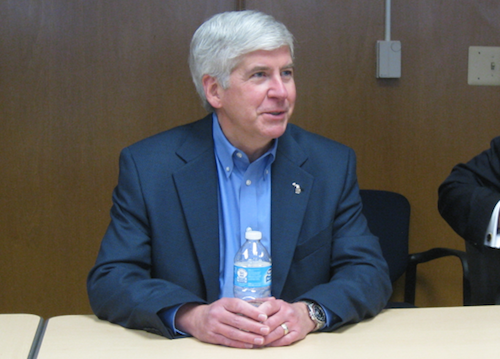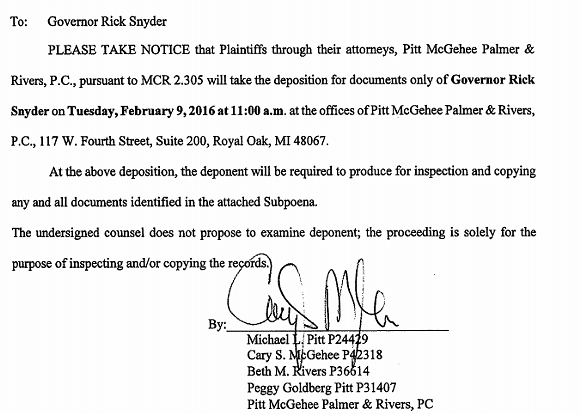Flint class-action suit lawyers subpoena Snyder records
The deadline has just passed for subpoenas to be delivered to the Snyder administration requesting records, the first credible legal action against the governor related to Flint we've heard of.
It was less than a week ago when Gov. Snyder, as part of his State of the State address, declared, "Tomorrow I will release my 2014 and 2015 e-mails regarding Flint to you, the citizens, so that you will have answers to your questions about what we’ve done ..."
Why shouldn't every interested citizen have those emails already? Because the governor is immune from state Freedom of Information Act laws, and Michigan is just one of two states in which this is the case.
And despite Snyder's announcement, critics immediately countered that the 2013 emails should have been included, as that was when key decisions were made regarding the use of Flint River water. And, needless to say, it was unfortunate that the cache of released emails opened with a message whose body was completely redacted. (One wag joked, "Black lines matter!")
And, in the wake of that email dump, one legislator pointed out that not all Snyder emails were released; as least one email sent to Snyder's public email address concerning the Flint crisis didn't appear. Is that too minor a quibble? The Free Press' Rochelle Riley didn't seem to think so.
An executive who's used to running private corporations, who's used to not having to open his books, who's used to not having to be accountable, and has tried to re-create government in that mold. Which is why, in the end, the people of Flint have had to resort to the tools used by consumers against corporate America: a class-action lawsuit.
Even now, as PR handlers and flacks circle their wagons around the embattled governor, chances are the public will finally get a chance to look through the communications that conducted to this crisis, and to see more of how cavalierly the bean-counting, legally shielded emergency managers treated the health and welfare of Michigan residents.
While it's satisfying to see the heat turned up on Gov. Snyder, it's important to remember why transparency is important. The American system of government says the government is supposed to answer to the people. Not in the way that a businessman surrounds himself with lawyers, ad men, and PR flacks and "answers" pre-screened questions with selected information. No, the people have a right to see the actions of the government without filters, with limited redaction, and to demand answers and get them speedily.
A lot of people shrugged when the emergency manager law was passed. "You can't make an omelet without breaking a few eggs," they said.
Now, thanks to lawyers like Bill Goodman, Julie Hurwitz, and others, we the people and the international press will have an opportunity to look at those broken eggs: damaged future opportunities, lifelong disabilities, and shredded infrastructure. And to see how cavalierly state officials aligned with the Snyder administration broke them when they thought nobody would ever see what happened.



